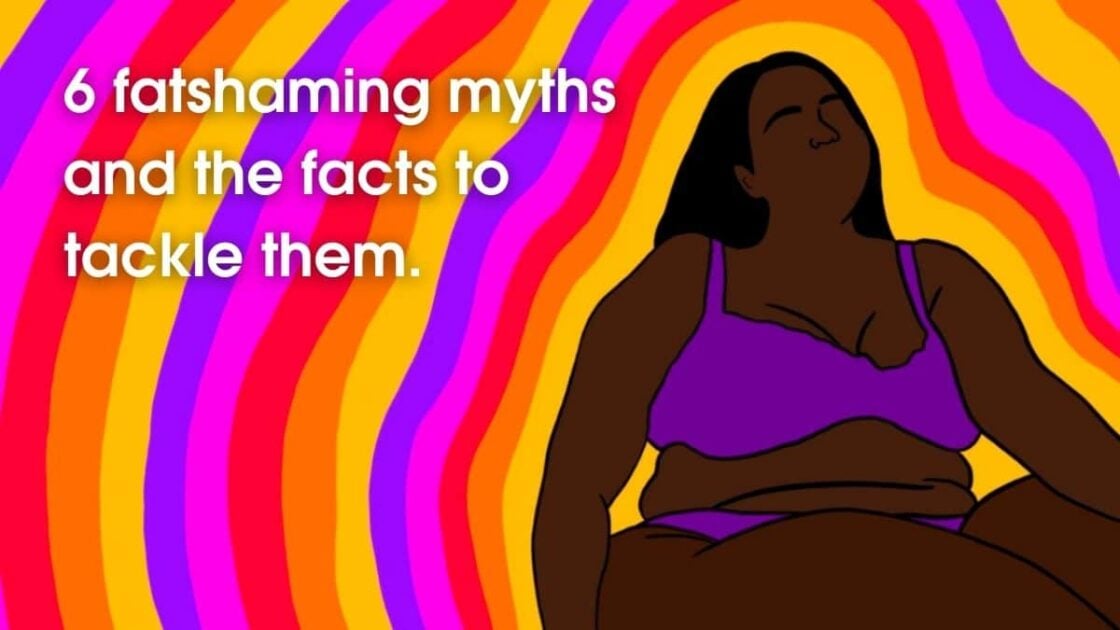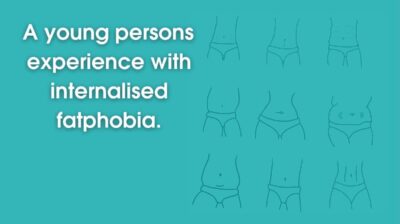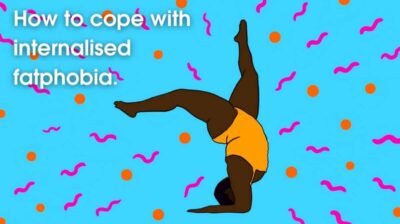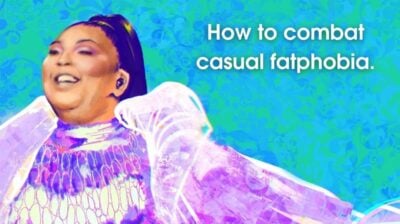6 fat-shaming myths and the facts to tackle them

TW // This article references eating disorders. Please look after yourself if you choose to read on. Our text support service details are listed below. While reading please keep in mind that everyone’s experience of eating disorders is different and sharing individual experiences serves to offer support to feel less alone. You can read about other people’s experiences of eating disorders.
“I went through a really hard time at school, which is not shocking. I put on a lot of weight and then I lost all this weight,” shared Honey Ross in the Pink Protest interview series, ‘Are You An Activist?’ on being plus-sized.
“Suddenly, people treated me really differently, and rather than being like ‘finally, I’m getting the validation from men that I’ve always wanted…’ I was literally like ‘the patriarchy is disgusting and I was perfect before.’ I just started to aggressively love myself and normalise this.”
She has noted being desexualised and fetishised by men all at once, being pressured into toxic diets and being told to hate herself. Her aim as an activist is that no girls have to feel the way she did about her body! But this issue runs deeper than simply one story and it goes by the name of fatphobia.
Fatphobia is the irrational fear of, aversion to, or discrimination against people with larger bodies. The World Health Organisation (WHO) has revealed that in 2016, more than 1.9 billion adults live in larger bodies. Body Mass Index (BMI) cannot be used as the only indicator of health and no one’s appearance validates discrimination.
Intuitive Eating Ireland says “there are over 50 factors that determine weight”. Fatphobia backs up the idea that we can blame solely the individual for their weight and shame them into one Eurocentric, idealised body type.
To begin breaking down fatphobic barriers, we need to break down some weight-related myths:
1. ‘Our bodies should conform to one shape and size’
From before we are even born, our bodies are incredibly complex make-ups of genes, fluids, cells, hormones and more. In ‘The Body’ by Bill Bryson, he states in amazement, “You have a metre of it (DNA) packed into every cell, and so many cells that if you formed all the DNA in your body into a single fine strand it would stretch ten billion miles, to beyond Pluto.”
Throughout our life, our bodies develop and grow, so our appearances do change. People have different body types so forcing people into an ideal shape that fluctuates like a fashion trend, is not only unrealistic but enormously damaging to our confidence and self-worth when most of us cannot achieve the current “ideal.”
2. ‘Weight = Health’
Many people pretend or even believe they are concerned about someone else’s health when really they are being fatphobic. Yes, nearly every population-level study finds that people with larger bodies have worse cardiovascular health than thin people, but studies simultaneously show that anywhere from 1/3 to 3/4 of people classified as “obese” are metabolically healthy while showing no signs of elevated blood pressure, insulin resistance or high cholesterol.
Meanwhile, studies indicate that unfit skinny people were twice as likely to get diabetes as fit people in larger bodies. The very definition of health from WHO, which is “a state of complete physical, mental and social well-being and not merely the absence of disease or infirmity,” mentions nothing about weight. Health clearly relates to your lifestyle habits of exercise, a balanced diet, minding your mental health, and having positive interactions with others. All of which can be obtained in any body type.
Rather than focusing on lifestyle, medically trained doctors have been reported to encourage weight loss as advice to overweight patients based on appearance, even when that person is suffering from an eating disorder or needs to have an ovarian cyst removed.
As a result, the fact that women with larger bodies are more likely to die of cervical cancer is partially attributed to their reluctance to see doctors and get screenings.
So indicators, from vegetable consumption and hydration to regular exercise and blood pressure, may provide a better understanding of someone’s health than looking at them.
3. ‘Appearance is the most important part of our identities’
Every human is a combination of experiences, thoughts, history, culture, and ability. It is incredible that each of us is unique, but we still shame people into hating themselves through fatphobia amongst other forms of discrimination.
As a society, we need to move away from placing an individual’s worth on their appearance, but as Gina Martin (a campaigner and writer) said in her TEDx talk about changing the UK law on upskirting, “We are done with waiting for society to change things for us, we literally are society.” You can start to change your thinking as an individual too.
4. ‘Weight-loss is achievable for everyone’
Some people also think that because they can lose weight, that it is as easy for everyone else. This is false; studies show an extremely high percentage of attempts to lose weight fail and many dieters gain back more than they lost. The reasons can be biological and irreversible. As explained by journalist, Michael Hobbes, losing body weight results in a slow down of your metabolism so a body-wide starvation response kicks in. This means Ghrelin, the hunger hormone, sends signals to your brain to eat and drops your internal temperature until you rise back to your highest weight.
Keeping weight off means fighting these responses and battling hunger continuously. On top of that, weight bias makes you eat more. The stress hormone cortisol designed for when you are in immense danger or apparently, being rejected for your looks, enhances appetite.
The diet culture industry knows this but continues to sell its’ promises of weight loss because most of the time, people do lose weight and so they think the company is great, then gain it back, and go running to the business to lose it again. But who’s profiting here?
5. ‘It’s the individual’s fault for “being fat”’
Clinical reports show there is a range of socio-economic and cultural factors behind a persons’ weight, including food supply. We know this because diet is the leading cause of death in the US, according to data published in JAMA and yet, Americans consume fewer calories now than in 2003.
It’s not just how much people are eating, but what. Our biological systems for regulating energy are overrun with additives from foods like takeaways, crisps, fizzy drinks, and more. These foods, like most, are perfectly healthy in moderation as part of a balanced diet, but because big corporations can produce them at low cost, the prices for processed foods are generally cheaper.
Meanwhile, more nutrient-dense options are inaccessible for some people’s income, and Ireland has just 160 commercial fruit and vegetable growers, and that number is falling. Exercise has also become a luxury, with disadvantaged individuals having to work more to survive, paid labour is taking up time for exercise. Access to a nutritional therapist, counselor, or private doctor of your choice is also unthinkable for many people, which could support them in finding the balanced diet, movement, and lifestyle that suits them. Wellness is no longer just a practice, but an industry.
These background issues, including poor diet, overworking, stress, and mental health issues impact people racialised as black, members of the Traveller community, transgender individuals, and other marginalised groups far worse. Meanwhile, campaigns to tackle “obesity” focus on eradicating fatness rather than everyone’s health or challenging anti-fat bias.
6. ‘Fatphobia is out of concern for someone’s health’
Hatred is not helpful. We need to stop shaming people to change their bodies, but actually, support everyone to live sustainable and healthy lifestyles. This can be achieved in how we use language around food, our bodies and exercise, during doctors’ appointments, reducing inequalities in food supply, through government initiatives, and more.
In fact, fatphobic messaging that prioritises weight loss at all costs can lead to disordered eating and eating disorders where eating (and exercise) preoccupy someone’s life and are dangerous for individuals’ physical and mental health.
These are all reasons why shaming is pointless, but even so, everyone deserves to be met with kindness and compassion rather than hate and assumptions.
Feeling overwhelmed and want to talk to someone?
- Get anonymous support 24/7 with our text message support service
- Connect with a trained volunteer who will listen to you, and help you to move forward feeling better
- Whatsapp us now or free-text SPUNOUT to 50808 to begin.
- Find out more about our text message support service
If you are a customer of the 48 or An Post network or cannot get through using the ‘50808’ short code please text HELLO to 086 1800 280 (standard message rates may apply). Some smaller networks do not support short codes like ‘50808’.






